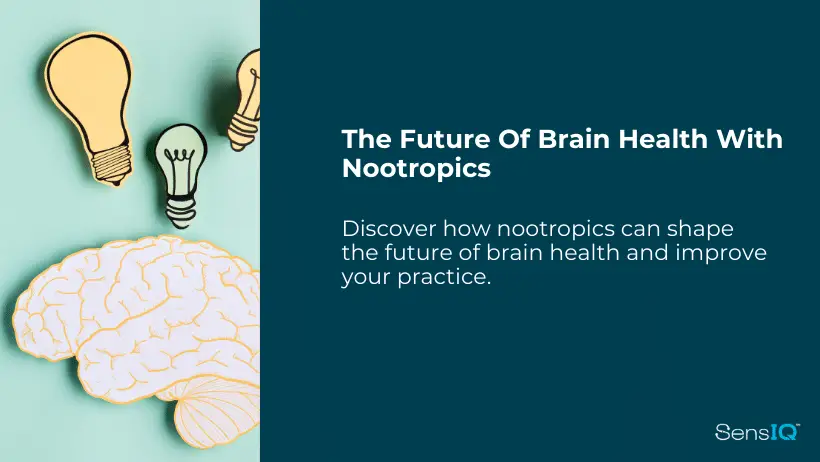The Future: How Nootropics Can Revolutionize Your Brain Health
In a world where the pursuit of health and longevity often leads us to explore the cutting edge of science and innovation, nootropics emerge as a guiding star of hope for enhancing brain health. These cognitive enhancers, often referred to as smart drugs, are designed to improve mental functions such as memory, creativity, and motivation, inviting individuals to unlock their fullest potential. As we delve into the fascinating world of nootropics, it becomes evident that these substances hold the promise of not only boosting cognitive function but also promoting overall wellness, offering a pathway for health-conscious individuals to become the best version of themselves. Discover why nootropics are seen as the next big thing in brain health, helping you take control of your mental journey with confidence and curiosity.
The Rise of Nootropics Origins and Development
Nootropics, a term coined by Romanian psychologist Dr. Corneliu E. Giurgea in the 1970s, were initially developed to enhance cognitive function without causing significant side effects. Giurgea’s pioneering work led to the creation of Piracetam, the first recognized nootropic, which aimed to improve memory and learning. From these early beginnings, the field of nootropics has expanded significantly. Researchers have explored a wide range of substances, from naturally occurring compounds like caffeine and ginkgo biloba to synthetic drugs designed to optimize brain performance. Over the decades, advances in neuroscience and biochemistry have deepened our understanding of how these substances interact with brain chemistry, leading to more targeted and effective formulations. Today, nootropics are integral to the biohacking movement, attracting those seeking to enhance mental acuity and promote long-term brain health.
Growing Popularity in Wellness
The growing interest in nootropics is driven by a rising focus on mental well-being and long-lasting brain health. As stress and mental fatigue become common in fast-paced modern lifestyles, people are seeking alternative solutions to maintain mental clarity and focus. Nootropics, with their potential to enhance cognitive abilities and support brain health, have captured the attention of wellness enthusiasts and biohackers alike. This surge in popularity is reflected in the expanding market of nootropic supplements, available in various forms to cater to diverse needs. Moreover, the holistic wellness movement embraces these cognitive enhancers as tools for achieving a balanced lifestyle. With growing evidence supporting their efficacy, nootropics are becoming a staple in personalized health regimes that prioritize mental well-being. As awareness of their benefits increases, more individuals are integrating nootropics into their daily routines, recognizing their role in fostering a sharper, more resilient mind in the pursuit of optimal health.
How Nootropics Enhance Brain Function
Boosting Cognitive Performance
Nootropics are increasingly recognized for their ability to bolster cognitive performance, making them invaluable tools for individuals seeking mental acuity. By modulating neurotransmitter levels, enhancing brain energy metabolism, and promoting neuroplasticity, these compounds help optimize various mental functions. For instance, nootropics like Bacopa Monnieri and Rhodiola Rosea are known to improve memory retention and reduce mental fatigue, respectively. Similarly, L-Theanine, enhances focus and attention while minimizing jittery side effects. The efficacy of these substances in enhancing cognitive abilities lies in their ability to support the brain’s natural processes. Moreover, they can aid in stress management and improve mood, indirectly contributing to better cognitive performance. As our understanding of brain health evolves, nootropics offer a promising avenue for those aiming to maintain a competitive edge in their professional and personal lives, ultimately supporting a more productive and fulfilling existence.
Improving Memory and Focus
Nootropics have gained acclaim for their potential to enhance memory and focus, vital components of cognitive function. Memory improvement is often linked to increased synaptic plasticity, which is the brain’s ability to form new connections. Compounds like Ginkgo Biloba and Huperzine A are renowned for their memory-enhancing properties, as they increase blood flow to the brain and inhibit enzymes that degrade neurotransmitters, respectively. On the other hand, focus enhancement is frequently attributed to substances that modulate dopamine and acetylcholine levels, neurotransmitters pivotal for attention and concentration. For example, Phosphatidylserine is known to support focus by maintaining healthy cell membranes, while enhancing overall cognitive stamina. The benefits of these nootropics are particularly appealing in contexts demanding sustained concentration, such as academic and professional settings. By integrating these cognitive enhancers into their routines, individuals can experience sharper memory recall and heightened focus, empowering them to navigate complex tasks with greater efficiency and clarity.
Nootropics and Overall Wellness
Supporting Mental Health
Nootropics offer significant promise in supporting mental health, complementing traditional approaches to wellness. Many nootropics have anxiolytic and mood-enhancing properties, which can help alleviate symptoms of stress and anxiety. Adaptogens like Ashwagandha and Rhodiola Rosea, for instance, are celebrated for their ability to modulate the body’s stress response, fostering a sense of calm and resilience. These benefits highlight the potential of nootropics in a holistic wellness approach. Adding nootropics to a health regimen can help individuals achieve better emotional balance and stress management. As focus on mental health intensifies, nootropics offer an essential tool for enhancing psychological resilience.
Enhancing Physical Well-being
Nootropics extend beyond brain benefits, aiding physical well-being by supporting inflammation reduction and recovery. Curcumin, especially when paired with black pepper, enhances absorption, mitigating inflammation effectively. Magnesium further aids by promoting muscle relaxation and recovery. Together, these nootropics support overall physical resilience and recovery, making them valuable for a balanced health regimen.
Scientific Backing and Research
Key Studies and Findings
Growing interest in nootropics is underpinned by strong scientific studies that highlight their efficacy in enhancing brain function and overall wellness. For instance, a randomized controlled trial on Bacopa Monnieri demonstrated its potential to improve memory and cognitive processing in healthy adults (Stough et al., 2001). Similarly, research on Rhodiola Rosea has shown its ability to reduce fatigue and improve mental performance during stress, reinforcing its role as an adaptogen (Olsson et al., 2009). Another noteworthy study revealed that L-Theanine enhances attention and cognitive flexibility, corroborating its use for focus enhancement (Kimura et al., 2007). These findings are not isolated; numerous clinical trials and meta-analyses continue to explore the diverse benefits of nootropics. As research progresses, it is increasingly evident that nootropics provide tangible cognitive and wellness advantages. This scientific backing not only enhances their credibility but also stimulates further exploration into their applications and mechanisms.
Experts’ Perspectives
Experts in neuroscience and nutrition offer useful insights into the potential and limitations of nootropics. Many researchers recognize the positive effects of certain nootropics, especially in enhancing cognitive functions like memory and focus. They stress the importance of understanding how these substances work to use them effectively. However, experts also warn against relying too much on nootropics without considering individual health needs and possible interactions with other medications. The general agreement is that while nootropics can be beneficial for cognitive enhancement, they should be combined with healthy lifestyle habits like a balanced diet, regular exercise, and enough sleep. This balanced approach allows individuals to make informed decisions and use nootropics responsibly.
Choosing the Right Nootropics
Factors to Consider
Selecting the right nootropics involves careful consideration of several factors to ensure their effectiveness and safety. First, it is crucial to identify your specific cognitive goals, such as enhancing memory, focus, or overall mental clarity. Different nootropics cater to various needs, and understanding your objectives can guide your choices. Additionally, consider the scientific evidence supporting each nootropic’s efficacy and safety profile. Reviewing clinical studies and expert recommendations can provide insights into the most reliable options. It is also important to assess any potential interactions with medications or underlying health conditions. Consulting healthcare professionals can offer personalized advice tailored to your health status. Furthermore, quality and sourcing are vital; ensure that you select products from reputable manufacturers that adhere to high safety and purity standards. Lastly, individual responses to nootropics can vary, so monitoring effects and adjusting dosages may be necessary. By considering these factors, you can make informed decisions and maximize the benefits of nootropics.
Popular Options Explained
Understanding popular nootropic options can help in selecting the right one for your needs. Piracetam, one of the earliest nootropics, is known for its potential to enhance memory and learning by modulating neurotransmitter activity. Bacopa Monnieri, a natural herb, is celebrated for its cognitive-enhancing properties, particularly in improving memory retention and reducing anxiety. L-Theanine, commonly found in tea, is often used to promote relaxation without sedation, especially when paired with caffeine to improve focus. Rhodiola Rosea is favored for its ability to reduce fatigue and enhance mental performance during stressful situations. Ginkgo Biloba, another plant-based nootropic, is used to improve circulation and cognitive function. Each of these options offers unique benefits and can be chosen according to specific cognitive goals. It is important to research and consider the scientific evidence behind each nootropic, tailoring choices to individual needs and health conditions for optimal results.
The Future of Brain Health
Innovations on the Horizon
The future of nootropics is poised for exciting advancements as research and technology continue to evolve. Emerging innovations are focusing on personalized nootropic regimens, tailored to individual genetic profiles and cognitive needs. Advances in genomics and artificial intelligence are paving the way for customized solutions that optimize brain health more effectively. Additionally, the development of novel compounds is underway, aiming to enhance cognitive function with greater precision and fewer side effects. Researchers are exploring the potential of combining nootropics with other cutting-edge technologies, such as neurofeedback and brain-computer interfaces, to amplify their effects. Another promising area is the integration of nootropics with digital health tools, enabling users to track and adjust their cognitive enhancement strategies in real-time. These innovations highlight the ongoing commitment to understanding and leveraging the complexities of brain health, offering a glimpse into a future where cognitive enhancement is both personalized and highly effective.
Long-term Benefits and Impact
The long-term benefits of nootropics extend beyond immediate cognitive enhancement, potentially impacting overall brain health and longevity. Consistent use of well-researched nootropics may aid in maintaining cognitive function and slowing down age-related decline. Compounds like Lion’s Mane and antioxidants are believed to support neuroprotection and reduce inflammation, which can contribute to healthier brain aging. Moreover, by promoting neuroplasticity and enhancing neurotransmitter function, nootropics may help preserve mental agility and memory retention over time. As science progresses, the understanding of how these substances contribute to long-term brain health will become clearer, offering insights into their role in preventing neurodegenerative diseases. The potential societal impact is significant, as improved cognitive health can enhance productivity and quality of life across the lifespan. By fostering a proactive approach to brain wellness, nootropics may play a crucial role in shaping the future of health, emphasizing the importance of lifelong cognitive care.
References:
-
Stough, C., Lloyd, J., Clarke, J., Downey, L., Hutchison, C., & Rodgers, T. (2001). The chronic effects of an extract of Bacopa monierri (Brahmi) on cognitive function in healthy human subjects. Psychopharmacology, 156(4), 481-484.
-
Olsson, E. M., von Schéele, B., & Panossian, A. G. (2009). A randomized, double-blind, placebo-controlled, parallel-group study of the standardized extract SHR-5 of the roots of Rhodiola rosea in the treatment of subjects with stress-related fatigue. Planta Medica, 75(2), 105-112.
-
Kimura, K., Ozeki, M., Juneja, L. R., & Ohira, H. (2007). L-Theanine reduces psychological and physiological stress responses. Biological Psychology, 74(1), 39-45.






